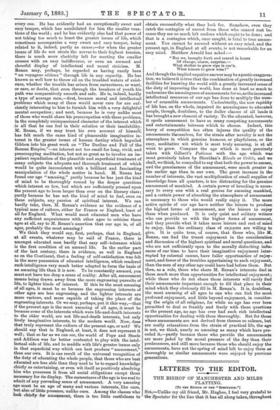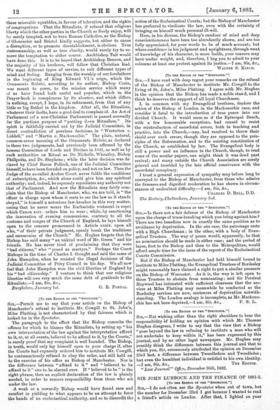LETTERS TO THE EDITOR.
THE BISHOP OF MANCHESTER AND MILES PL.A.TTENG.
[To THE Burros or rum "SrscrAroa."]
Sra,—Unlike my old friend, Mr. Hughes, I feel very grateful to the Spectator for the line that it has all along taken, throughout these miserable squabbles, in favour of toleration and the rights of congregations. That the Ritualists, if refused that religious liberty which the other parties in the Church so freely enjoy, will be sorely tempted, not to turn Roman Catholics, as the Bishop of Gloucester and Bristol kindly suggests, but either to cause a disruption, or to promote disestablishment, is obvious. True statesmanship, as well as true charity, would surely try to re- move the temptation to either course. Archbishop Tait would have done this. It is to be hoped that Archbishop Benson, and the majority of his brethren, will follow that Christian lead. We want different types of service, to suit different types of mind and feeling. Ranging from the worship of our forefathers in the beginning of King Edward VI.'s reign, which the Ornaments Rubric, according to its author, Bishop Cosin, was meant to cover, to the mission service which many of us have found both useful and popular, which in the Prayer-book is conspicuous by its absence, and which differs in nothing, except, I hope, in its refinement, from that of any little or big Bethel in the kingdom. After all, the Ritualists, whatever their faults, have a good deal to complain of. An Act of Parliament (of a non-Christian Parliament) is passed avowedly for the partisan purpose of "putting dawn Ritualism." Its spirit is faithfully carried out by the Judicial Committee, in direct contradiction of previous decisions, in ".Westerton v. Liddell," and "Martin v. Mackonoehie." The plain, natural, common-sense meaning of the Ornaments Rubric, as declared in these two judgements, had previously been affirmed by the famous Committee of Lords and Divines in 1641, as well as by such authorities on Ritual as Dr. Nicholls, Wheatley, Bishop Phillpotts, and Dr. Stephens ; while the later decision was de- clared by Chief Baron Pollock, one of the Judicial Committee himself, to have been founded on policy, and not on law. Then the Judge of the so-called Arches Court never fulfils the conditions of subscription, &c., which alone could give him any spiritual authority; and, indeed, he expressly repudiates any authority not that of Parliament. And now the Ritualists may fairly com- plain that the Bishop of Manchester, who, we are told, is "the officer in charge upon whom it rests to see the law as it stands obeyed," is himself a notorious law-breaker in this very matter, seeing that he never wears the Eucharistic vestment (a cope) which Canon xxiv. orders him to wear ; while, by sanctioning the innovation of evening communions, contrary to all the customs and usages of the Church of England, he lays himself open to the censure pronounced in Article xxxiv. upon all who, "of their private judgment, openly break the traditions and ceremonies of the Church." Mr. Hughes forgets that the Bishop has said many "an unkind word of Mr. Green" and his friends, He has never tired of proclaiming that they were " bad citizens," who "posed as martyrs." Perhaps the Court Bishops in the time of Charles I. thought and said the same of John Hampden, when he resisted the illegal decisions of the Judicial Committee of Privy Council in his day. We all now feel that John Hampden won the civil liberties of England by his "bad citizenship." I venture to think that our religious liberties will owe very much the same debt of gratitude to the Ritialists.—I am, Sir, &c.,















































 Previous page
Previous page